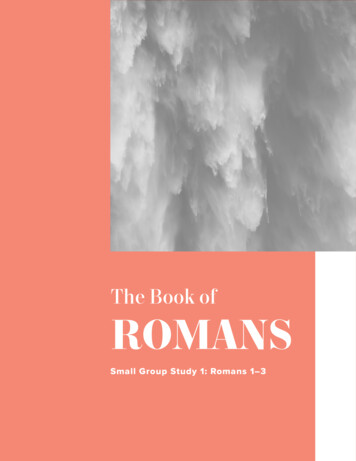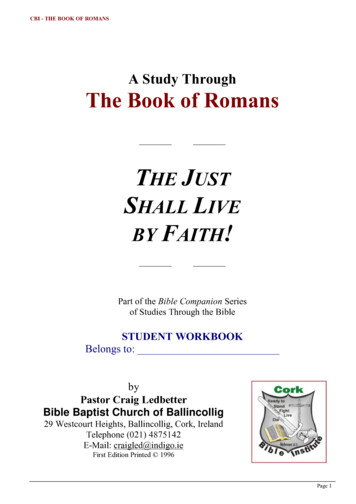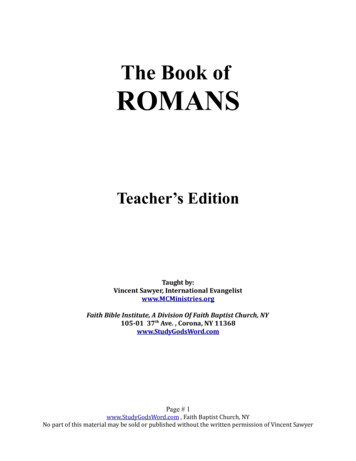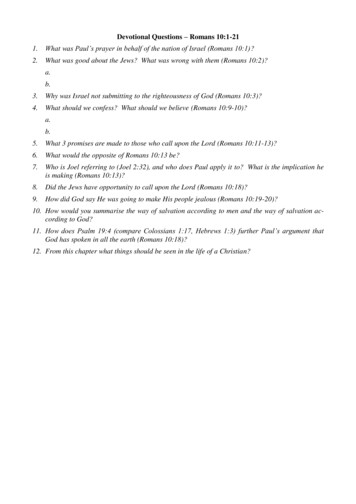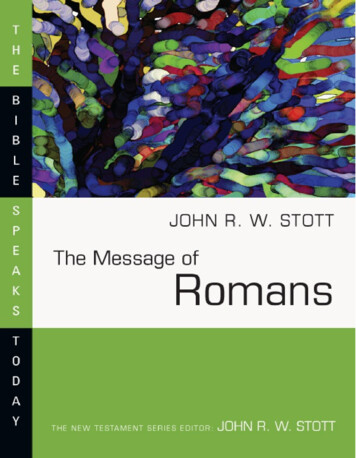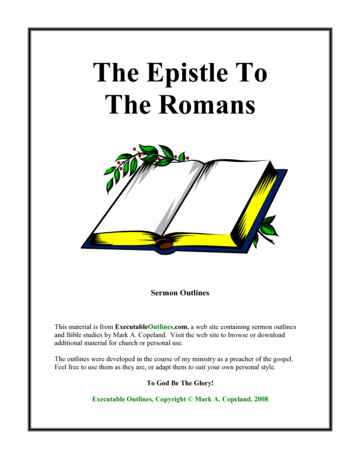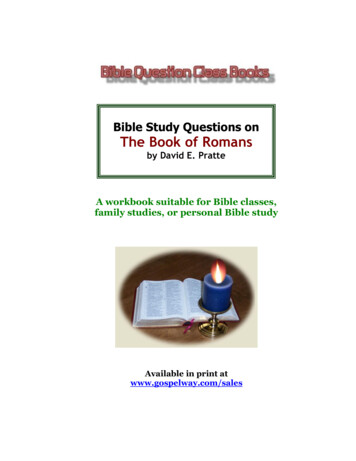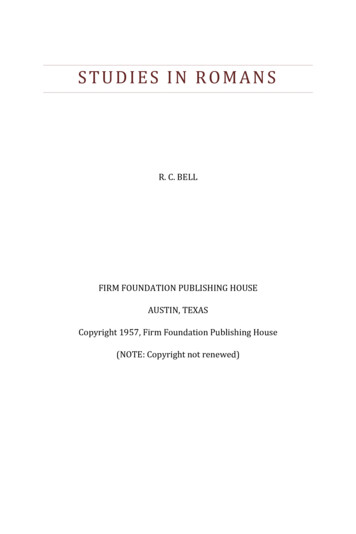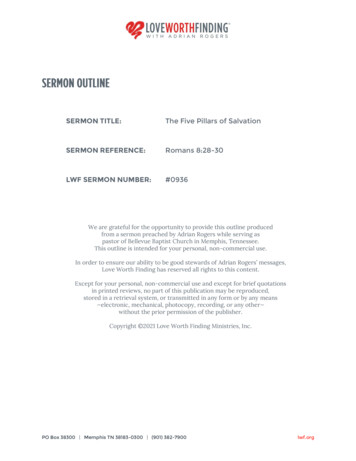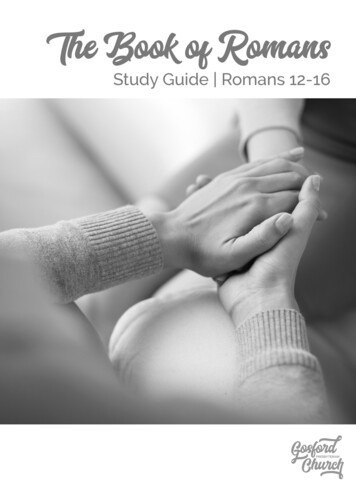
Transcription
The Book of RomansStudy Guide Romans 12-16
1
Week 1 - Romans 12:1-13Spiritual GiftsTo start off Some have thought that landing on your particular spiritual gifts ismuch like doing a personality test, like the Enneagram or MyersBrigg’s versions, to assess what type of personality you are and youraccompanying strengths, weakness, and opportunities for growth. Sofor instance, the Enneagram test will assess you against 9 personalitytypes listed below:1 - THE REFORMERThe Rational, Idealistic Type:Principled, Purposeful, Self-Controlled, and Perfectionistic2 - THE HELPERThe Caring, Interpersonal Type:Generous, Demonstrative, People-Pleasing, and Possessive3 - THE ACHIEVERThe Success-Oriented, Pragmatic Type:Adaptable, Excelling, Driven, and Image-Conscious4 - THE INDIVIDUALISTThe Sensitive, Introspective Type:Expressive, Dramatic, Self-Absorbed, and Temperamental5 - THE INVESTIGATORThe Intense, Cerebral Type:Perceptive, Innovative, Secretive, and Isolated6 - THE LOYALISTThe Committed, Security-Oriented Type:Engaging, Responsible, Anxious, and Suspicious7 - THE ENTHUSIASTThe Busy, Variety-Seeking Type:Spontaneous, Versatile, Acquisitive, and Scattered8 - THE CHALLENGERThe Powerful, Dominating Type:Self-Confident, Decisive, Willful, and Confrontational9 - THE PEACEMAKERThe Easygoing, Self-Effacing Type:Receptive, Reassuring, Agreeable, and Complacent2
1. Which of these personality types do you think best fits you?2. How might knowing your personality type impact on identifying andunderstanding your spiritual gifts?3. What might be the danger of relying on personality tests likeEnneagram for identifying and understanding our spiritual gifts?Read Romans 12:1-84. What are the grounds that Paul sees for understanding our spiritualgifts?5. What is remarkable about Paul urging us to offer ourselves as livingsacrifices to God? (Rom 6:13-19)3
6. How do we test and approve God’s good, pleasing and perfectwill?7. How are we transformed by the renewing of our mind? (contrastRom 1:25-28)8. What is the starting point for acknowledging our spiritual gifts?9. Do we have an option to exercise our spiritual gifts or not? Why/why not?Read Romans 12:9-13 and think it through10. How might these verse help you identify your spiritual gifts? (vss9-13)4
11. What has God given you for someone else and for the broaderneed of the body of Christ?12. How might we encourage others in our church family to identifyand exercise their spiritual gifts?PrayThank God for each GG member's spiritual gifts and for opportunityto exercise them.5
Week 2 - Romans 12:9-21Love. Inside and OutTo start off Last study we looked at the first part of chapter 12 where theapostle Paul talks about the implications of knowing God’s mercyin Jesus, as serving Jesus. This service looks like loving peoplewith the heart, gifts, experiences and skills that God has uniquelyequipped each of us with. And its to loving people, both thoseinside and outside God’s family, those who love us and thosewho don’t, that Paul now turns to in Romans 12:9-21.Read Romans 12:9-161. Table what love is to look like.Love is vs 9vs 10vs 11vs 12vs 136
vs 14vs 15vs 16When Paul urges patience in affliction in verse 12, he likely has inmind the temptations accompanying the physical persecution ofhis original readers (Mark 4:16-17).2. What might we suffer from more here in Australia? (Mark4:18-19)3. How then might we apply verse 12 to our experience? (forexample, what might patience look like in our context?)4. How might verse 13 be a remedy for the spiritual complacencyof verse 11 that Paul warns against?7
The Greek word translated ‘hospitality’ is philozenia which is afusion of two words philos (love) and zenos (stranger), literallyreading ‘love of the stranger’.5. Who do you think the ‘stranger’ might be for us? (1 Timothy5:3-16, James 1:27, Romans 15:24, 16:2)6. What will it look like to love them? (vss 13-16)After spending time predominantly on what it looks like to lovethose inside God’s family, Paul then turns to what it looks like tolove those who are not only outside but actively opposing God’speople.Read Romans 12:17-21 and think it through7. Is the instinct for retributive justice a good or a bad thing?Why/why not?8
Read Deuteronomy 32:3-418. Given Paul quotes verse 35 in Romans 12:19, why is it betterto leave room for God’s wrath rather than to take revenge?Think it throughIn quoting from Proverbs 25:21-22 in verse 20, Paul seems to beadvocating some kind of pay-back of our enemies.9. What does it mean to ‘heap burning coals’ on our enemy’shead?Finish off 10. Think of an ‘insider’ and note a practical way to love themthis week.11. Think of an ‘outsider’ or ‘enemy’ and note a practical way tolove them this week.PrayFor the insider and the outsider.9
Week 3 - Romans 13:1-10Love. For the authorities.To start off The apostle Paul had a generally positive experience with the Romangovernment officials. As a Roman citizen, certain civil privileges wereextended to him that on more than one occasion saved him fromangry mobs and plots to kill him (see Acts 16, 21, 22 and 25).However, Paul believed that his Lord Jesus was unjustly killed by theRoman empire. As such, we can’t dodge Paul’s teaching in Romans13 on submitting to the authorities as him just being naive.Read Romans 13:1-71. Why are we to submit to the governing authorities?2. Who are the governing authorities?3. Ideally, what are the governing authorities responsible for? (see also1 Peter 2:13-14)4. How might we avoid paying taxes?10
5. What might it look like to give respect and honour to the governingauthorities?Read Matthew 22:15-21 and think it through6. What does Jesus’ teaching tell us of the hierarchy of authority thatwe must submit to?7. When might submitting to God mean NOT submitting to thegoverning authorities? (Acts 4:19-20, 5:27-29)8. List some examples of governmental evil currently at work in theworld.9. What might it look like to submit to God first in the face of thisinstitutional evil.11
Read Romans 13:8-10 and think it through10. How might the command to ‘love your neighbour’ bear on anydecision to submit or otherwise to the governing authorities?PrayFor the governing authorities.12
Week 4 - Romans 13:8-14Love. In all of lifeTo start off Most in our society believe you should be able to do whatever you likeas long as you’re not hurting anyone. What’s good about this beliefand what’s not so good about it?Read Romans 13:8-101. What’s debt must we always pay? Why?2. How might loving others as yourself ‘sum up’ the commandmentsof the Law of Moses?3. How is love the fulfilment of the Law?13
Read Romans 13:11-14 and think it through4. What is the ‘salvation’ Paul is referring to verse 11?5. What is the relationship between loving our neighbour and the hourof Christ’s return?Elsewhere, Paul talks about those who have faith in Jesus as alreadybeing clothed in him (Gal 3:26-27). That by faith we belong to him. Heis ‘in’ us (Rom 8:10) and we are ‘in’ him (Rom 6:11).6. What then does Paul mean here in Romans 13:14 to cloth yourselfwith the Lord Jesus Christ? (Rom 6:12-14 and 8:11-14)7. What is the significance of equating clothing ourselves with theLord Jesus (vs14) and putting on the armour of light (vs12)?8. What does clothing ourselves in Christ in this way inform us of thenature of love?14
Think it through9. How does ‘love your neighbour’ both affirm and challenge thecultural shibboleth ‘do whatever you like as long as you’re not hurtinganyone’?10. How do we simultaneously cloth ourselves with Christ and notthink about how to gratify the desire of the flesh?11. Think of some practical ways you can love others:in your Growth Group15
at your place of study or occupationin your familyat churchPrayPerhaps have a time of confessing sins to God and seeking his aid tolove better.16
Week 5 - Romans 14Love. In faithto start off It is likely that the church in Rome in Paul’s day was predominantlymade up of Gentiles, with a few Jews. And the interest Paul has forthe believers to be living their faith out in love, turns to the particularconcern that those who are strong in faith (the Gentiles) accept andlove those who are weak in faith (the Jews).Read Romans 14:1-121. What are the ‘disputable matters’ in the church in Rome at thetime?2. What is Paul’s instruction to the weak? To the strong?3. What are the governing principles in Paul’s instruction here?17
Read Isaiah 45:22-244. What is Paul wanting to emphasise in quoting Isaiah 45:23 in verse11?5. What might be some ‘disputable matters’ for us in our context?6. What ‘disputable matter’ are you more tempted to judge yourfellow believer on?18
7. What should we do if we are tempted to judge or have judged ourfellow believer on a ‘disputable matter’?Read Romans 14:13-238. Apart from not judging each other, what more are we to do in lovefor each other?9. What are the reasons for this concession?19
10. Does this concession suggest I should determine my conduct byfear of criticism from other Christians? Why or why not?11. What specifically would a critical brother or sister in Christ have todo before I would be guilty of making them stumble?prayfor strengthening of faith in and by love amongst our church familyand all church families20
Week 6 - Romans 15:1-13Love. Jew and GentileRead Romans 15:1-13The opening verses of chapter 15 are bringing to a close Paul’sdiscussion concerning issues involving our liberty as followers ofChrist. The church in Rome consisted of Jew and Gentile, matureas well as new believers. Paul is anxious to stress the vital issue ofunity in the church. In chapter 14 we learned that the strong feelfree to eat anything without asking questions while the weak arelimited by a variety of scruples. (‘failings’ in NIV 15:1 is betterunderstood as weaknesses or scruples).In GosfordPC instead of Jew and Gentile we have a range ofgenerations, which while being a means of enrichment in ourfellowship could at times lead to differing opinions.1. What are some possible differences of opinion which may existbetween people of different generations in our church?21
2. What do you think it means to please one’s neighbour rather thanone’s self? (verses 1 & 2)3. According to verse 3, how was Jesus a model of not pleasinghimself? If Christ had insisted on pleasing himself how different wouldhis life had been?4. In each of the following verses, write down how Jesus did notplease himself.2 Corinthians 8:9Philippians 2:5-8Hebrews 12:222
Verse 4 stresses the importance of the Old Testament and states thatwe receive hope from endurance and the encouragement of theScriptures.5. Share an instance when something you read in the Bible enabledyou to renew hope.As you think about v 6. consider an orchestra with all the differentinstruments and a choir with people singing different parts. Howmuch richer the orchestra sounds with a variety of instruments ratherthan just one kind. Likewise the choir joining parts rather than unison.This is a good metaphor for the variety of personalities and gifts in theaverage congregation.6. What is vital to the finished result for choir and orchestra to bedisciplined in producing beautiful music? And for the church?7. In the context of verses 7 and 8 what groups of people is Paultelling to accept one another?23
8. What do think would be the main difficulties in doing this?Read Genesis 12:1-3 and note the wonder of the fulfilment in v8b.To add to the amazing work of God consider the fact that theauthor of this letter is Paul who once was a fanatical enemy of theGospel of Christ now praising God because of how his promisesare being fulfilled among the Gentiles because they have heard andaccepted the Gospel of Christ.Romans 15:12 is a quote from Isaiah ch 11.Read Isaiah 11:1-12.Although the original ‘shoot’ is King Hezekiah it is obvious that theultimate object of this prophecy is the coming of the Messiah. Hischaracter and the blessings of his kingdom are described.9. What is the main point the three quotes from the Old Testamentare making.24
10. In the light of 15:13 consider what we have discussed in thepreceding verses.a. How have we been encouraged to behave as churchmembers (vv 1-9)?b. What is the result (v.6)?c. How has God confirmed his promises to the patriarchs (v.8b)?d. How do you think vv 1-12 combine to help us believe, thatno matter what our present situation is we can overflow withhope by the power of the Holy Spirit?Pray.Thank God for the blessings mentioned in this passage.25
Week 7 - Romans 15:14-33Love. Gentile and JewAlthough Paul was not the founder of the church in Rome, asapostle to the Gentiles he writes to encourage, challenge andreinforce teachings they are already aware of. In Matthew28:18-20 Jesus left his disciples the great commission to go to allnations with the gospel and Paul has obeyed this commandmagnificently. In the verses we are looking at today heemphasizes the need to reach those who have not been reachedand gives an account of where he has already been. He nowaims to go to Spain desiring that enroute he may be able to fulfilhis desire to visit the church at Rome. First however, he had topay a visit to Jerusalem. He is longing to meet the believers inRome and reinforce the information he has received from otherbrethren concerning them.Read Romans 15:14-33.1.Read Paul’s description of the Roman Christians in ch 1:8. Howdoes he add to this in verses 14-16 ?Read Romans 1:9-10 where Paul assures the Roman Christiansthat he prays for them at all times and in 15:31 where he asksthem to pray for him.2. Do you have a regular plan to pray for missionaries? Share with thegroup regular prayer information you receive that may be anencouragement for others to increase their prayer commitment.26
Read Acts 15:5-8 and Philippians 3:2-33. How does Peter refute the requirement made by the Judaizers thatGentile converts should be circumcised? How does Paul use thesame thought in Romans 15:16 to argue against the Jewish criticsclaim that the uncircumcised are unclean?4. In verses 17-19 would you accuse Paul of bragging why or whynot?5. What do we learn about Paul’s strategy for mission in verse 20?In his book “The Key to the Missionary Problem” (1901) AndrewMurray says that the raison d’etre (most important purpose) of thechurch of Jesus Christ is to take the gospel to those who have notheard.6. Do you agree? How would you describe your own personalcommitment to this challenge as well as our church’s commitment?27
7. Why was Paul going to Jerusalem (v.25)?8. What did the Gentiles owe the Jews (v 27)?On his journey to Jerusalem Paul stayed a few days at Caesarea.Read Acts 21:10-14 to see what happened there.9. Do you think it was right for Paul to continue his journey toJerusalem after this warning?Read Acts 16:6-710. Is this a similar occurrence?28
Read Romans 1: 8-10.In the beginning of Romans and now in its closing chapters Paulspeaks of his desire to visit the believers in Rome. In 15:23 we readthat because in the regions he described (v.19) the gospel has beenpreached he plans to take the gospel to Spain and visit Rome on theway.Paul’s desire to go to Rome was fulfilled but not as he imagined.Read Philippians 1:12-18 written from a Roman prison.10. What was the means by which Paul eventually went to Rome andwhat was the result of this longed for visit?PrayThank God for Paul’s ministry and ask that we will not only be inspiredbut also learn from his endurance and obedience.29
Week 8 - Romans 16:1-16Those we loveTo start off In these final chapters of Romans, Paul has stressed the way of lovein the life of God’s people. Love for those inside the church and thoseoutside. Love for friends and for enemies. Love for all in God’s family,weak and strong, Jew and Gentile. And as he concludes Romans,Paul goes on to list all those he personally knows and loves in God’sfamily. It is a list that reveals the great diversity among God’s people,including Gentiles and Jews, slaves and freemen, rich and poor.1. Of what value is it to have a church family made up of differenteducational, racial, economic and social backgrounds?Read Romans 16:1-162. Identify the characteristics and qualities of the people to whom Paulsends his greetings. What things stand out about them?3. Would you feel at home among them? Why or why not?4. What would they contribute to your life? Why?30
5. What does verse 16 tells us about life together in Christ? Whatmight be a modern counterpart of a holy kiss?Reread Romans 16:1-5 and 76. How does Paul describe Phoebe?Read Acts 18:1-3, 24-28Of the six times Priscilla and Aquila are mentioned in the Bible ( Acts18:2, 18, 26, Rom 16:3, 1 Cor 16:9 and 2 Tim 4:9), four of thosetimes Priscilla is mentioned before her husband.7. Why do you think Paul mentions Priscilla before her husband herein Romans?Read 1 Corinthians 15:3-88. If Junia is one of the apostles in verse 1 Cor 15:7, what might itmean that Paul calls her outstanding here in Romans?31
In many religions in the ancient world, women were relegated to theouter fringes of worship. Romans 16 suggests that the early churchwas different. Apart from there being many women mentioned, it’ssignificant that Paul fronts his list here with a couple of prominentwoman, Phoebe and Priscilla.Phoebe would’ve been at the top of more than just Paul’s list. Shewas probably a wealthy businesswoman, who used her wealth andpersonal gifting to greatly support the church and its missionaries.Priscilla was renowned more than her husband for one-one teaching,hosting a church in her house, and co-working with Paul in thegospel.Another notable woman in Paul’s greetings is Junia who is‘outstanding’ among the apostles. Given she is a Jew who was inChrist before Paul was, it may be that she was amongst those initial500 or so to whom the risen Jesus personally appeared, who werethen sent out as the little ‘a’ apostles mentioned in 1 Corinthians15:3-8. That Paul tags Junia as ‘outstanding’ and the fact she wasincarcerated along with Paul suggests she said or did somethingsignificantly admirable and public for the sake of the gospel.Along with these notable woman, Paul admires Mary, Tryphena,Trophosa and Persis as hard-workers in the Lord, not to mention theraft of others who are named.Clearly the apostle Paul treasured women in the church. He praisesand promotes them in their gospel work as patrons, leaders, mentors,teachers, stelar missionaries, friends, mothers and more.And so should we.32
Think it through9. If you were to write a letter to our church family, who might featureprominently in your sign-off greeting list and why? What would yousay of their gospel work?prayThank God for all the people in his church.Thank God particularly for the women in our church family who toilfaithfully in the work of the gospel.33
Week 9 - Romans 16:1 7-27Love. In truth and for GodTo start off In these final chapters of Romans Paul has majored on love as theproper response to God merciful love to us in Christ. Love for others.And to the end he practices what he preaches, as he looks to love hisreaders for the sake of truth to the glory of God.Read Romans 17:17-201. How does Paul continue to love God’s people?2. How does Paul profile a false teacher?3. How might this help us to be wise about what is good andinnocent about what is evil?34
4. What larger battle is being waged? (vs 20) Given the outcome, howmight this be an encouragement to be wise about what is good andinnocent about what is evil?5. List some ways we might be wise about what is good and innocentabout what is evilRead Romans 16:21-276. Where is Paul’s confidence in his reader’s faith working itself out inlove?7. What attributes of God does Paul mention here?8. What else do we learn of God from the things Paul says he does?35
9. How does Paul conclude his reflections on who God is and whathe’s done? Why is this appropriate?10. Write your own prayer in the light of all you’ve learned in our studyof Romans of God and what he’s done. And then perhaps pray themtogether in your GG.PrayMaybe say together the prayer of blessing of verses 25-27.36
37
The Book of Romans Study Guide Romans 12-16 . 1. W!k 1 - Romans 12:1-13 Spiritual Gifts To start off Some have thought that landing on your particular spiritual gifts is much like doing a personality test, like the Enneagram or Myers-Brigg’s vers
